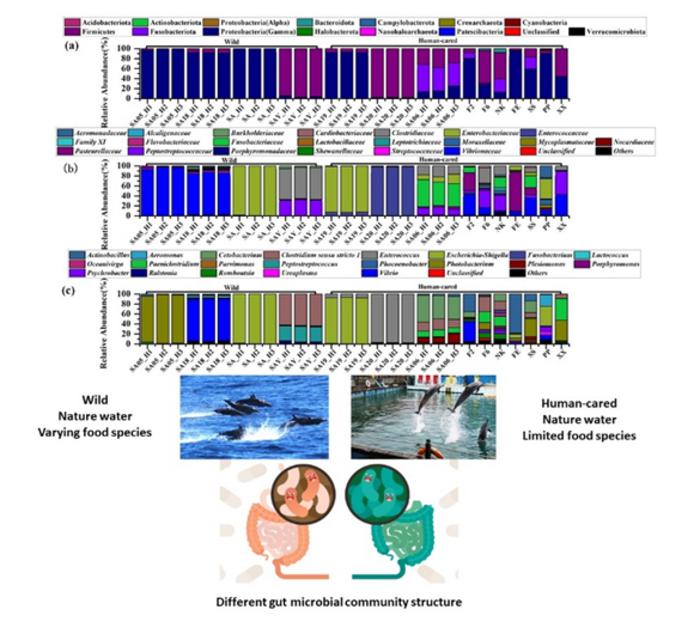A recent study published in Water Biology and Security highlighted the significant role of food source variations in shaping the gut microbiome of spotted dolphins, even when they inhabit similar environments.
A recent study published in Water Biology and Security highlighted the significant role of food source variations in shaping the gut microbiome of spotted dolphins, even when they inhabit similar environments.
“The gut microbiome serves crucial functions in food digestion and acts as a secondary immune system for the host. Despite increasing recognition of their importance, our understanding of marine mammal gut microbiomes remains limited due to challenges in sampling,” shares corresponding author Peijun Zhang, a professor at the Institute of Deep-sea Science and Engineering, Chinese Academy of Sciences.
Several factors such as phylogeny, environment and diet can influence the composition and structure of gut microbes. However, identifying the dominant driving force remains unclear. In a prior study by the team, significant differences in gut microbiomes among marine mammal species above the family level, even when exposed to similar diets and aquatic environments, were shown. Building on this, the present study investigates the impact of food variations—wild dolphins feeding on natural prey versus human-cared dolphins with a restricted fish diet—while controlling for environmental factors within the same geographical population of spotted dolphins.
“We used the V4 region of the 16S rRNA gene for gut microbe classification, and found notable differences in the gastrointestinal microbial community structure between wild and human-cared dolphins, both overall and at specific sites,” explains Zhang. “Interestingly, microbial diversity in their gastrointestinal tracts did not differ significantly, suggesting that disparities primarily stem from variations in microbiota composition.”
Indicator microbes were determined both in wild dolphin (five ASVs) and human-cared dolphin (three ASVs) groups. Furthermore, numerous potentially pathogenic bacteria were identified, underscoring the need for comprehensive future research on marine mammal gut microbiology.
“Our findings not only enhance the understanding of spotted dolphin gut microbiology, but also shed light on the similarities and differences in gastrointestinal microbial communities within the same marine mammal species, particularly when food source variations play a significant role in their ecology,” adds Zhang.
###
Contact the author: Peijun Zhang, Institute of Deep-sea Science and Engineering, Chinese Academy of Sciences, [email protected]
The publisher KeAi was established by Elsevier and China Science Publishing & Media Ltd to unfold quality research globally. In 2013, our focus shifted to open access publishing. We now proudly publish more than 100 world-class, open access, English language journals, spanning all scientific disciplines. Many of these are titles we publish in partnership with prestigious societies and academic institutions, such as the National Natural Science Foundation of China (NSFC).
Journal
Water Biology and Security
DOI
10.1016/j.watbs.2024.100288
Method of Research
Case study
Subject of Research
Animals
Article Title
Similarities and differences in gastrointestinal microbiomes between wild and human-cared spotted dolphins (Stenella attenuata) in natural waters
COI Statement
The authors declare no conflict of interest.





